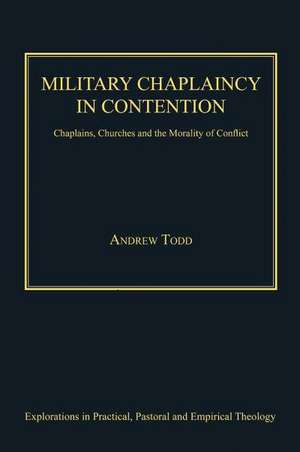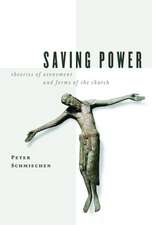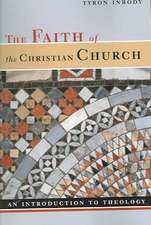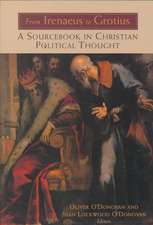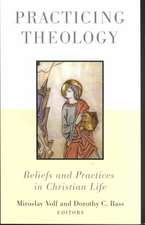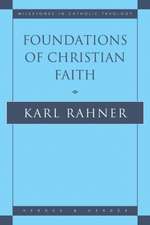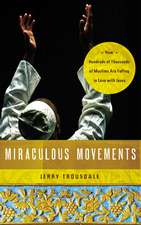Military Chaplaincy in Contention: Chaplains, Churches and the Morality of Conflict: Explorations in Practical, Pastoral and Empirical Theology
Editat de Andrew Todden Limba Engleză Hardback – 23 mai 2013
| Toate formatele și edițiile | Preț | Express |
|---|---|---|
| Paperback (1) | 382.86 lei 6-8 săpt. | |
| Taylor & Francis – 23 mai 2013 | 382.86 lei 6-8 săpt. | |
| Hardback (1) | 1055.51 lei 6-8 săpt. | |
| Taylor & Francis – 23 mai 2013 | 1055.51 lei 6-8 săpt. |
Din seria Explorations in Practical, Pastoral and Empirical Theology
-
 Preț: 310.43 lei
Preț: 310.43 lei -
 Preț: 310.65 lei
Preț: 310.65 lei -
 Preț: 310.08 lei
Preț: 310.08 lei -
 Preț: 386.77 lei
Preț: 386.77 lei -
 Preț: 310.99 lei
Preț: 310.99 lei -
 Preț: 385.58 lei
Preț: 385.58 lei -
 Preț: 416.22 lei
Preț: 416.22 lei -
 Preț: 469.34 lei
Preț: 469.34 lei -
 Preț: 376.99 lei
Preț: 376.99 lei -
 Preț: 421.07 lei
Preț: 421.07 lei - 18%
 Preț: 1000.27 lei
Preț: 1000.27 lei - 18%
 Preț: 1056.28 lei
Preț: 1056.28 lei -
 Preț: 469.34 lei
Preț: 469.34 lei -
 Preț: 391.51 lei
Preț: 391.51 lei -
 Preț: 469.34 lei
Preț: 469.34 lei -
 Preț: 416.22 lei
Preț: 416.22 lei - 18%
 Preț: 1003.43 lei
Preț: 1003.43 lei - 18%
 Preț: 1000.27 lei
Preț: 1000.27 lei - 26%
 Preț: 765.01 lei
Preț: 765.01 lei -
 Preț: 416.22 lei
Preț: 416.22 lei - 18%
 Preț: 1050.78 lei
Preț: 1050.78 lei -
 Preț: 409.13 lei
Preț: 409.13 lei -
 Preț: 316.62 lei
Preț: 316.62 lei - 25%
 Preț: 767.20 lei
Preț: 767.20 lei - 18%
 Preț: 1057.09 lei
Preț: 1057.09 lei -
 Preț: 409.65 lei
Preț: 409.65 lei -
 Preț: 469.34 lei
Preț: 469.34 lei - 26%
 Preț: 820.71 lei
Preț: 820.71 lei - 26%
 Preț: 819.90 lei
Preț: 819.90 lei - 18%
 Preț: 1057.09 lei
Preț: 1057.09 lei -
 Preț: 481.79 lei
Preț: 481.79 lei - 18%
 Preț: 1002.63 lei
Preț: 1002.63 lei - 18%
 Preț: 1001.84 lei
Preț: 1001.84 lei - 18%
 Preț: 1000.27 lei
Preț: 1000.27 lei - 26%
 Preț: 874.74 lei
Preț: 874.74 lei
Preț: 1055.51 lei
Preț vechi: 1287.22 lei
-18% Nou
Puncte Express: 1583
Preț estimativ în valută:
201.97€ • 210.87$ • 167.16£
201.97€ • 210.87$ • 167.16£
Carte tipărită la comandă
Livrare economică 04-18 aprilie
Preluare comenzi: 021 569.72.76
Specificații
ISBN-13: 9781409431572
ISBN-10: 1409431576
Pagini: 200
Ilustrații: black & white illustrations
Dimensiuni: 156 x 234 x 13 mm
Greutate: 0.48 kg
Ediția:New ed
Editura: Taylor & Francis
Colecția Routledge
Seria Explorations in Practical, Pastoral and Empirical Theology
Locul publicării:Oxford, United Kingdom
ISBN-10: 1409431576
Pagini: 200
Ilustrații: black & white illustrations
Dimensiuni: 156 x 234 x 13 mm
Greutate: 0.48 kg
Ediția:New ed
Editura: Taylor & Francis
Colecția Routledge
Seria Explorations in Practical, Pastoral and Empirical Theology
Locul publicării:Oxford, United Kingdom
Notă biografică
Revd Canon Dr Andrew Todd is the Director of the Cardiff Centre for Chaplaincy Studies, employed jointly by St. Michael's College and Cardiff University. He leads research into public sector chaplaincy (including in the armed services). He directs the MTh in Chaplaincy Studies, delivered to Army Chaplains under contract to the MoD, which Cardiff has just won for the third time. He is also involved in lecturing on ethics to all British Army Chaplains. He has wide experience of theological education and is a past President of the Cambridge Theological Federation. He has published a number of articles on military chaplaincy and a number of articles and book chapters on other areas of practical theology. He wrote, with Michael West and Graham Noble, Living Theology (DLT, 1999), for which he did much of the editing.
Recenzii
’The presence of Christian chaplains on the battlefield focuses in a very sharp way the wider tension between a gospel of peace and the need for armed force in a brutal world. I welcome this book as a much needed and valuable contribution from those with first-hand experience of the role and the willingness to think theologically about that tension and the dilemmas it poses.’ Professor The Rt Revd Lord Richard Harries '... well-researched and written and [...] an important contribution to the debate which should be taking place.' The Pastoral Review
Cuprins
Part I Chaplaincy in Contention; Chapter 1 Chaplaincy in Contention, AndrewTodd; Chapter 2 Moral Soldiering and Soldiers’ Morale, AndrewTotten; Chapter 3 ‘You’ve Been Silent, Padre’, PhilipMcCormack; Part II The Wider Context of Chaplaincy in Contention; Chapter 4 Terrorism and Interrogation, as an Issue for Chaplains on Operations, PeterSedgwick; Chapter 5 The Robotisation of War, DavidFisher; Part III Chaplains and their Churches; Chapter 6 The British Churches and their Chaplains, PeterHowson; Chapter 7 ‘O Hear Us When We Cry to Thee’, JonathanBall; Chapter 8 Just War, JamesColeman; Chapter 9 Moral Engagements, AndrewTodd, ColinButler;
Descriere
Through the unique chaplain’s eye view of the significance of their experience for understanding the ethics of war, this book offers clearer understanding of chaplaincy in the context of the changing nature of international conflict (shaped around insurgency and non-state forces) and explores the response of faith communities to the role of the armed services. It makes the case for relocating understandings of just war within a theological framework and for a clear understanding of the relationship between the mission of chaplaincy and that of the military.
